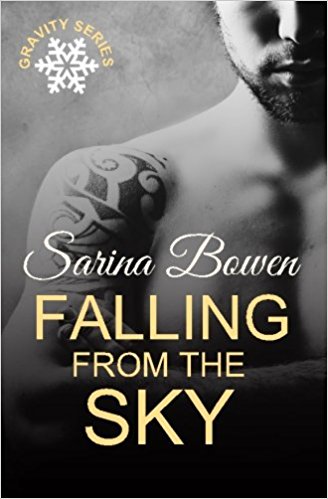 This is another sports-themed winner from Bowen. As the second in the Gravity series, it’s still snow sports. Hank “Hazardous” Lazarus is a renowned snowboarder on his way to the Olympics and Callie Anders (who we know from the first book in the series—she’s Willow’s doctor friend) meets him at the beginning of the book right before he mistimes a jump and gives himself a serious spinal injury. She ends up seeing him in the hospital not long afterward, when it’s not clear if he’ll walk again.
This is another sports-themed winner from Bowen. As the second in the Gravity series, it’s still snow sports. Hank “Hazardous” Lazarus is a renowned snowboarder on his way to the Olympics and Callie Anders (who we know from the first book in the series—she’s Willow’s doctor friend) meets him at the beginning of the book right before he mistimes a jump and gives himself a serious spinal injury. She ends up seeing him in the hospital not long afterward, when it’s not clear if he’ll walk again.
Nine months later, she sees him in the hospital again—this time for alcohol poisoning. He asks her out but of course she says no because he’s her patient. But they both make an impression on each other anyway. A little later, Hank signs up for a study that’s supposed to help with mobility and because his parents are basically funding the study, he gets away with stipulating that he’ll only participate if Callie runs it. So this puts them in regular contact, and because he’s technically not her patient, Callie might be able to date him (she’s not entirely clear on the ethics).
They do get to know each other better and spend some time together, but it’s a bumpy ride. Hank still has a little more work to do to accept his condition (though he’s not doing too bad, really). Callie’s struggles aren’t quite as life-altering. Her ex—a doctor who cheated on her—is still around at the hospital, reminding her of her loneliness. But she can’t take Hank too seriously, as she knows he was a player before his accident and is used to beautiful women throwing themselves at him. She doesn’t want to be the one he settles for. Hank’s got to convince her he is serious.
Bowen is just so good. Her dialogue is sharp, the feels are real and deep, the heat level is high, and she goes in depth into the challenges the characters are facing. There are so many wonderful details that only someone who knows what they’re talking about would know. For instance, she talks about how Callie quickly learns to stand a bit away from anyone in a wheelchair so that when they’re talking, they don’t have to strain their neck looking up at her. And the concept of the zone of transition—the area between regular feeling and the damaged area, which has heightened sensitivity. Plus there are some of the doctor things Callie thinks and does.
Of course, if you love Bowen as much as I do, you have to read this one. But I think anyone who likes a good story that deals with genuinely challenging issues would also like it.